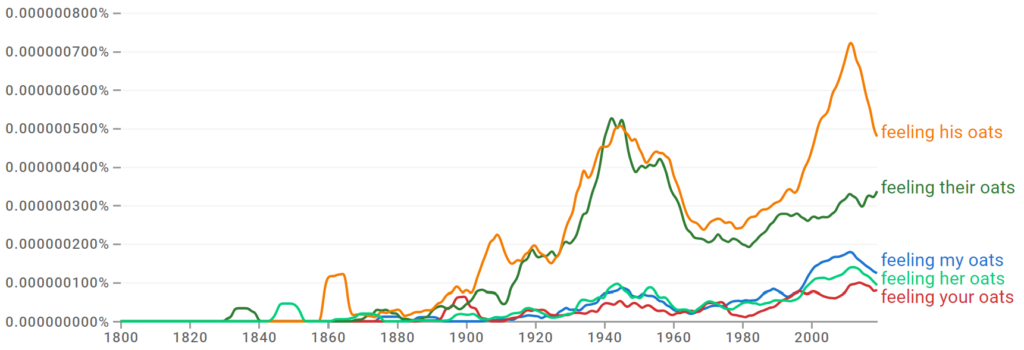The phrase feeling my oats, along with its variations like feeling your oats or one’s oats, signifies that someone feels energetic and confident. Originating in America, this idiom actually has a literal background related to horses.
Now, let’s dig deep into the meaning and origin of this phrase and explore how you can incorporate it into contemporary, everyday language.
What Is the Meaning of Feeling My Oats?

Feeling one’s oats is an American idiom that signifies a sense of boldness, empowerment, or high energy, sometimes to the brink of arrogance or cockiness. Generally, the expression is used when the speaker is tolerant or even appreciative of the subject’s enthusiasm, even if it borders on overconfidence.
For example:
- The students were clearly feeling their oats during the first week of school. Fortunately, they started to settle down by the second week.
- Investors felt their oats as they confidently put money into high-risk businesses during this inflationary period.
- Every now and then, I feel my oats and let a sarcastic or snarky comment slip.
In these examples, you can see how the phrase is adaptable to different contexts, whether it’s the exuberance of students at the start of the school year or the audacity of investors in a volatile market.
Feeling Your Oats Origins and History

The expression feeling my oats was first recorded in print in the Boston Transcript in 1831:
- “Whether the pony felt his oats…he took a frightful canter.”
Though this is the first documented instance, it’s likely the phrase had been in spoken use for some time before it made it into print. The idiom is rooted in the observation of horses, who, after eating oats—an energy-rich grain—often become more energetic. The term “feeling hot” is sometimes used to describe a horse’s heightened energy after consuming oats.
The phrase’s applicability extended beyond horses to human emotions and actions. In 1843, comedic author Thomas Chandler Haliburton first used the expression to highlight one character’s insult towards another:
- “You know that, and feel your oats, too, as well as any one. So don’t be so infarnal mealy-mouthed, with your mock modesty.”
The direct connection between a horse’s behavior and human nature is highlighted in Herman Melville’s story “Bartleby the Scrivener,” published in 1853. In the tale, one of the characters gives an expensive coat to a man named Turkey, who accepts the gift with insolence:
- “In fact, precisely as a rash, restive horse is said to feel his oats, so Turkey felt his coat.”
Let’s Review
Originating in the early 19th century as an observation of a horse’s increased energy after consuming a meal rich in sugars and starches, the term feeling my oats has found its way into human vocabulary. When someone says they’re “feeling their oats,” it usually means they’re feeling bold, empowered, and full of energy.
Almost exclusively used in a figurative sense, this idiom can describe both animals and humans to highlight behavior that is spirited, audacious, or carried out with confidence. Whether it’s to explain an investor’s daring move or a student’s boundless enthusiasm, feeling one’s oats captures the essence of that invigorating, sometimes reckless, confidence.
Check out some others we covered:
